
INRAE Productions Animales
Scope & Guideline
Fostering Interdisciplinary Collaboration in Animal Science
Introduction
Aims and Scopes
- Sustainable Animal Production:
Research dedicated to improving sustainability in livestock systems, focusing on practices that reduce environmental impact and promote eco-friendly methods. - Animal Welfare and Health:
Studies exploring the health and welfare of farm animals, emphasizing humane treatment and the development of practices that ensure the well-being of livestock. - Nutritional Strategies and Feed Efficiency:
Investigations into nutrition tailored for various animal species, aiming to enhance feed efficiency and the overall health of livestock through innovative feeding strategies. - Genetics and Breeding Practices:
Research on genetic selection and breeding practices to improve animal traits, health outcomes, and productivity in livestock. - Agroecology and Systemic Approaches:
Exploration of agroecological principles applied to livestock farming, including the integration of livestock into broader ecological and agricultural systems. - Economic and Societal Impacts:
Analysis of the socio-economic aspects of animal production, including market dynamics, consumer preferences, and the implications for rural economies.
Trending and Emerging
- Climate Change Adaptation Strategies:
There is a growing focus on developing strategies to mitigate the impacts of climate change on animal production, addressing issues such as feed efficiency and resilience in livestock systems. - Organic and Alternative Production Systems:
Research on organic farming and alternative production methods is trending, driven by consumer demand for sustainable and ethically produced animal products. - Use of Technology in Animal Health and Nutrition:
Emerging technologies, including precision feeding and genomics, are increasingly featured, showcasing their potential to enhance animal health and production efficiency. - Animal Models for Health Research:
The use of organoids and in vitro models in studying animal health and diseases is becoming more prominent, reflecting advancements in scientific methodologies. - Socio-Economic Assessments of Animal Production:
There is an expanding interest in the socio-economic implications of animal production, including consumer behavior and market dynamics, which are crucial for shaping future policies.
Declining or Waning
- Traditional Antibiotic Use:
Research on the use of traditional antibiotics in livestock has decreased, likely due to increasing emphasis on alternative health management strategies and the global push to reduce antimicrobial resistance. - Historical Practices in Livestock Management:
Studies focusing on historical methods of livestock management are less common, as the field shifts towards innovative and forward-thinking practices that address current challenges. - Conventional Feed Practices:
There is a noticeable decline in research centered around conventional feed practices, as the focus moves towards alternative and sustainable feeding strategies. - Single-Species Production Systems:
Research on single-species production systems is becoming less frequent, reflecting a shift towards multi-species and integrated farming systems that promote biodiversity. - Standardization in Animal Production:
The emphasis on standardization in production methods is waning, with increasing interest in personalized and context-specific approaches to animal husbandry.
Similar Journals
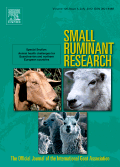
SMALL RUMINANT RESEARCH
Empowering the future of small ruminant production.SMALL RUMINANT RESEARCH is a premier academic journal committed to advancing the field of animal science, specifically focusing on the study and management of small ruminants. Published by Elsevier, this esteemed journal holds a significant standing, ranked in the Q2 category for both Animal Science and Zoology as well as Food Animals in 2023, reflecting its influence and relevance in the academic community. With an ISSN of 0921-4488 and an E-ISSN of 1879-0941, it disseminates high-quality research that encompasses a wide spectrum of topics, including nutrition, genetics, health, and management practices for sheep and goats. Although it does not offer open access, the journal ensures rigorous peer review and publishes articles that aim to bridge research gaps and promote best practices among industry practitioners. With its contribution to knowledge spanning from 1988 to 2024, SMALL RUMINANT RESEARCH serves as an essential resource for researchers, practitioners, and students dedicated to the enhancement of small ruminant production and welfare.
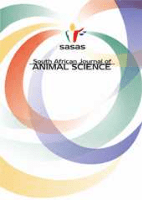
SOUTH AFRICAN JOURNAL OF ANIMAL SCIENCE
Innovating research in animal welfare and nutrition.SOUTH AFRICAN JOURNAL OF ANIMAL SCIENCE is a leading scholarly publication dedicated to the dissemination of original research, review articles, and critical insights in the fields of animal science and zoology. Established in 1974, this journal is published by the South African Journal of Animal Sciences and has since become an essential resource for researchers and professionals in the field. The journal, which currently holds a Q3 ranking in Animal Science and Zoology as per Scopus rankings, aims to promote scientific knowledge and innovation in animal husbandry, welfare, nutrition, and breeding practices, with a particular emphasis on the South African context. The journal's rigorous peer-review process ensures high-quality research is shared widely among the academic community. Researchers and students alike will find valuable content and access options that support ongoing education and professional development in this vital area of study. For more information, interested readers can contact the editorial office at PO Box 13884, Hatfield 0028, South Africa.

Scientific Papers-Series D-Animal Science
Innovating Research for Healthier AnimalsScientific Papers-Series D-Animal Science is a prominent academic journal published by the University of Agronomic Sciences and Veterinary Medicine Bucharest (USAMV). With its ISSN number 2285-5750 and E-ISSN 2393-2260, this journal serves as a critical platform for the dissemination of innovative research in the field of animal science and veterinary medicine. The journal focuses on a broad range of topics, from animal breeding and nutrition to health and welfare, contributing significantly to the advancement of knowledge and practice within these vital areas. Although it currently does not offer open access, the journal maintains a commitment to high-quality research with the potential to influence policy and practice in animal sciences. Researchers, professionals, and students are encouraged to engage with the journal to enhance their understanding and contribute to ongoing discussions in this essential field. The journal's rich academic environment fosters collaboration and encourages submissions of original studies, reviews, and case reports that can shape the future of animal science.
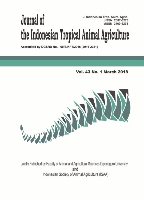
Journal of the Indonesian Tropical Animal Agriculture
Transforming Tropical Animal Agriculture through ResearchJournal of the Indonesian Tropical Animal Agriculture is an esteemed peer-reviewed journal published by UNIV DIPONEGORO, focusing on the dynamic fields of animal science and veterinary medicine. Since its inception in 2009, the journal has maintained an open access policy, ensuring that valuable research is freely available to the global scientific community. Based in Indonesia, the journal has adapted to the evolving agricultural landscape and now contributes significantly to both local and international discourse on tropical animal husbandry. With a Scopus rank placing it within the 36th percentile for general veterinary sciences and the 25th percentile for animal science and zoology, it is emerging as a valuable resource for researchers and professionals alike. The journal covers a broad range of topics within its scope, fostering innovative approaches and solutions tailored to the unique challenges of the tropical environment. By exploring critical issues in animal agriculture, this journal not only enhances academic knowledge but also supports sustainable practices within the industry. We invite researchers, students, and professionals in the realm of veterinary science and animal agriculture to engage with the rich array of research presented in this journal.
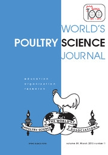
WORLDS POULTRY SCIENCE JOURNAL
Empowering researchers with cutting-edge poultry science insights.Worlds Poultry Science Journal, published by Taylor & Francis Ltd, is a premier academic journal in the field of poultry science, recognized for its significant contributions to advancements in animal science and zoology. With an impressive impact factor and a 2023 ranking placing it in the Q1 category for both Agricultural and Biological Sciences, this journal is highly regarded among researchers and professionals. As an authoritative source for innovative research from 1945 to 2024, it serves as an essential platform for the dissemination of knowledge concerning poultry health, nutrition, genetics, and management strategies. While it currently does not offer open access, the journal caters to a global audience, fostering collaboration and advancing scientific understanding within the poultry industry. Located in the United Kingdom, Worlds Poultry Science Journal is positioned at the forefront of poultry research, making it an invaluable resource for students, scholars, and industry experts alike.
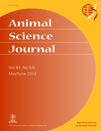
ANIMAL SCIENCE JOURNAL
Uncovering Insights for a Sustainable Future in Animal SciencesAnimal Science Journal, published by Wiley, stands as a premier platform for advancing knowledge in the fields of Agricultural and Biological Sciences, Animal Science and Zoology, and Food Science. With an ISSN of 1344-3941 and an E-ISSN of 1740-0929, this journal not only enjoys a commendable Q2 ranking across multiple categories, reflecting its significance and impact within the academic community, but it also ranks within the top percentiles in terms of Scopus rankings. Operating out of the United Kingdom, the journal covers a broad spectrum of research topics relevant to animal science, encompassing both theoretical insights and practical applications. While it is not an open access journal, it remains an essential resource for researchers and practitioners eager to enhance their understanding of animal sciences, contribute to ongoing debates, and stay abreast of the latest findings from 2003 through 2024. Scholar engagement and innovative research are central to the journal’s objectives, making it an invaluable asset for students, professionals, and academics alike.

CANADIAN JOURNAL OF ANIMAL SCIENCE
Connecting Researchers to the Heart of Animal ScienceCanadian Journal of Animal Science, published by Canadian Science Publishing, stands as a pivotal platform in the fields of Animal Science and Zoology, reflecting its commitment to advancing knowledge and research in these crucial areas. Operating since 1975, with dedicated publication since 1993, this journal boasts an impactful history and has established itself within the academic community, holding a 2023 Q2 category rank in Animal Science and Zoology, and a Q3 rank in Food Animals. With its ISSN 0008-3984 and E-ISSN 1918-1825, the journal is accessible to a wide audience, promoting collaboration and the dissemination of innovation across borders. Although not an open-access journal, its valuable insights and research findings serve as essential resources for researchers, professionals, and students striving to enhance their understanding of animal science, veterinary studies, and agricultural practices. As the field of animal science continues to evolve, the Canadian Journal of Animal Science remains a vibrant and influential part of this dynamic landscape.

Poultry Science Journal
Fostering collaboration in the world of poultry science.Poultry Science Journal, with the ISSN 2345-6604 and E-ISSN 2345-6566, is an esteemed publication spearheaded by Gorgan University of Agricultural Sciences & Natural Resources since its transition to Open Access in 2013. Based in Iran, this journal serves as a vital platform for disseminating cutting-edge research and innovative advancements in the fields of Animal Science and Food Animals. With a current impact reflected in its Q3 quartile ranking within its categories and Scopus ranks indicating a competitive standing among peers, the journal plays a crucial role in enhancing the academic discourse surrounding poultry science. Researchers, professionals, and students alike are encouraged to engage with the journal’s high-quality content, which encompasses diverse topics including poultry genetics, nutrition, health, and welfare, thereby contributing to the improvement of poultry production practices globally. The journal’s commitment to accessibility ensures that valuable findings are readily available to the scientific community, fostering collaboration and advancing research in this essential domain of agricultural science.

Revista MVZ Cordoba
Exploring the frontiers of Veterinary Medicine from Colombia.Revista MVZ Cordoba, an esteemed publication of UNIV CORDOBA, is a pivotal resource for researchers and practitioners in the fields of Animal Science, Zoology, and Veterinary Medicine. Established as an Open Access journal since 2000, it facilitates widespread accessibility of scholarly articles from Colombia, fostering global collaboration and knowledge dissemination. The journal has demonstrated its commitment to quality, holding Q4 quartile rankings in 2023 across various categories including Animal Science and Zoology, and Aquatic Science. Despite its current challenges in rankings, with percentiles in the lower brackets, it represents an important platform for the advancements in these disciplines, specifically catering to emerging research and insights. The journal's annual publication cycle from 2008 to 2024 ensures that it remains timely and relevant in covering contemporary issues within veterinary science and related areas. For researchers, professionals, and students, Revista MVZ Cordoba stands out as a valuable avenue for the exploration of veterinary sciences within a diverse academic landscape.
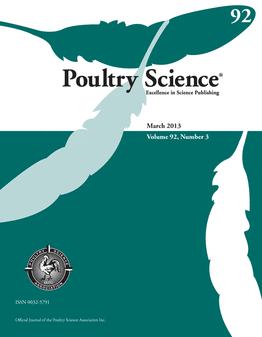
POULTRY SCIENCE
Unlocking the potential of poultry science for global impact.POULTRY SCIENCE is a premier, peer-reviewed journal published by ELSEVIER, dedicated to advancing the field of avian biology and poultry production, encompassing a wide array of topics from genetics and physiology to nutrition and management practices. With an impressive impact factor and inclusion in the Q1 quartile for both Animal Science and Zoology as well as Miscellaneous Medicine, this journal is recognized as a leading source of high-quality research among its peers, ranking 17th out of 490 in its category. Since transitioning to Open Access in 2020, the journal has expanded its reach, allowing global accessibility to its significant findings, which are crucial for researchers, industry professionals, and students alike. The journal’s continuous publication from 1965 to 2024 underscores its long-standing commitment to fostering innovation in poultry science, making it an invaluable resource for anyone involved in the progression of this vital sector.